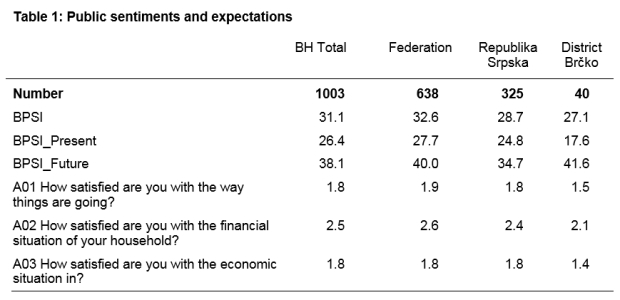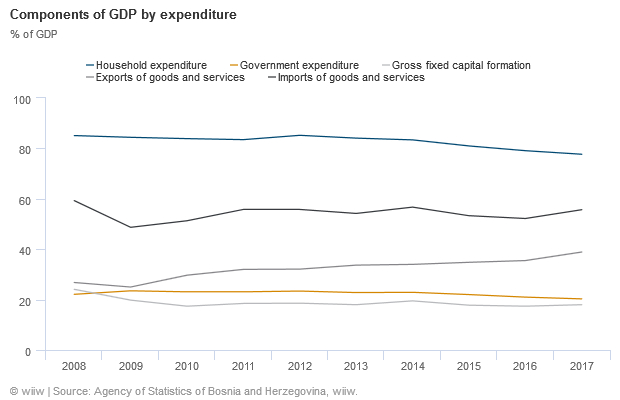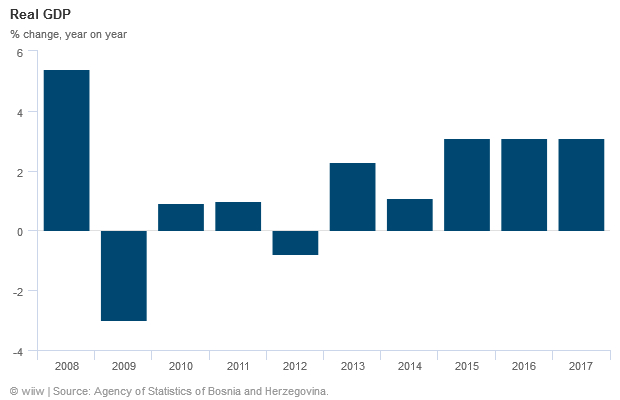Things do not change: elections in Bosnia and Herzegovina
15 October 2018
The result surprised nobody. Positive political change will come in Bosnia, but that could take a while.
- The latest election results in Bosnia produced few positive outcomes.
- The outcome was more important to Serbia, Russia and Turkey than to the EU or the US, both of which are distracted by internal issues.
- The country’s mood is gloomy, though firms are becoming more optimistic as economic conditions improve.
- Positive political change is happening only very slowly, and the pull of the EU is currently very weak.
- There is currently no mechanism for widespread dissatisfaction among the population to be translated into political change. Dayton makes meaningful political change in Bosnia very difficult.
- However, over time something will have to give. Until then, a high share of Bosnians will continue to vote with their feet and emigrate.
Permanent Gloom
Bosnia and Herzegovina (B&H) has persistently been the most pessimistic of the Balkan countries surveyed by the Balkan Barometer in the last four years. Other sources mostly confirm this finding for a decade or two. However, economic performance is not necessarily worse than in the other countries in the region. Compared with Serbia and Croatia, for example, it has been quite a bit better since 2008. In the latest 2018 Balkan Barometer, however, business expectations improved somewhat, so one interesting question is whether this better atmosphere is shared equally across the two entities and the Brčko District (the sample for the latter is too small to attach much meaning to).
Table 1 breaks down overall evaluations by the public in Bosnia and Herzegovina and its constituent parts. The Federation feels better overall and is more hopeful for the future. These are still gloomy levels, though, because they are well below the mid-points which could be interpreted as neither good or hopeful nor bad or hopeless respectively.
Table 2 details the sentiments and expectations of business people. The difference between the Federation and the Republika Srpska is starker. The numbers are small but not unrepresentative, while those for Brčko are reported only for the sake of completeness and can be disregarded.
Businesses in the Federation have much more optimistic expectations than those in the Republika Srpska. This is more important than the difference in the evaluations of the current state of affairs because the interviewees are managers who should be forward looking.
A more detailed breakdown of both the public and the business surveys shows broadly the same difference between the Federation and the Republika Srpska (by age, gender, employment, education, income). Though the public is terribly unsatisfied and expects little, the overall feeling in the Federation is slightly better. On the business side, however, the more detailed breakdown confirms that a larger gap has opened between the more optimistic Federation and the less hopeful Republika Srpska.
These perceptions generally accord with the statistical view of the situation in Bosnia and Herzegovina and its two entities. In terms of economic performance, access to markets, and to finance, the Federation is in better shape. However, while public dissatisfaction is widespread, there is little evidence in the Balkan Barometer findings that suggest significant political movement for change. The public appears resigned to the way things are.
Half a step forward, one step back
The latest general elections, presidential and parliamentary, confirmed the longstanding divisions within the ethnic groups, and between them, as well as the persistent dominance of their key parties: the Serbian Alliance of Independent Social Democrats (SNSD), Bosniak Party of Democratic Action (SDA), and the Croatian Democratic Union (HDZ). The results are in fact a step back compared to the last election when the opposition to the SNSD did better in the B&H parliamentary and presidential elections. The situation now is somewhat reversed. At the central level the three parties dominate. The exception is the Croatian member of the Presidency who is not from the HDZ.
That latter exception is important because it highlights the deep problem in the constitutional set-up of the country. The central government is supposed to represent the three ethnic groups, but the way the country is gerrymandered does not support that in the Croatian case. Bosniaks vote for the Croatian representative too in the mixed population territories. Therefore, they may, as they did twice before, vote for the candidate that is not from HDZ. Who, of course, still has to be a Croat. In the B&H Parliament, a coalition of the three largest parties can be expected.
The situation in the two entities, the Republika Srpska and the Federation, as well as in the ten cantons, is different from the central government. The real power is indeed there. In the Republika Srpska, the president is from SNSD, but the opposition, all the other parties together, has close to a two-thirds majority. In the Federation, the descendants of the former Communist Party, the Social Democrats, still attract significant number of votes, although mainly from Bosniaks. Therefore, protracted negotiations to form coalitions to run the entities and the cantons are ahead.
Still, in all the political trades that will come, the three largest parties representing the three ethnicities will play the pivotal role. This is a step back compared to the previous elections, though not a big one.
No way to go
The electoral outcomes are predictable given the constitutional set-up of the country. It makes sense to review its key political motivation. It was that the ethnic division will be maintained in the complex confederal system of power which is indecisive so that secessions are impossible. They are in any case ruled out by the constitution but are also hard to manage by any one ethnic group alone. So, the constitution, drown up in Dayton, Ohio, in 1995 cements internal ethnic secessions, but rules out secessions.
Thus, politically, at least at the central level, either internal secessions have to be deepened even further to make it possible for the ethnic groups to seceded externally eventually, and be annexed by Serbia or Croatia, or the representatives of the three ethnic groups have to agree to change the constitution at least in the sense of making the political process more democratic. Both of which are rather discouraged than encouraged by the Dayton Constitution.
The assumption of the founding fathers of the constitution, mostly the US and the EU, with Russian assistance, was that the internal economic interests and the interests to economically integrate regionally and internationally, e.g. with the EU, would induce political actors in B&H to improve at least the functionality of their constitution.
That was worse than wrong, it was a mistake, to paraphrase Talleyrand. The outcome has been one of permanent political impasse with predictably slow economic development. The outside options are more those of emigration rather than political pressure to integrate internally or with the EU.
Slow Change
In the last decade, some incremental change has taken place. The overall economic model of B&H (and of some other Balkan economics, e.g. Serbia and Montenegro) is that the population consumes, foreigners invest. The figure below shows that overall consumption, households and general government, is around 100% of GDP. Investments are basically covered by the trade deficit (the deficit of the current account is much smaller due to a high inflow of remittances). Since 2008, there has been a slow process of restructuring due to growing exports and decreasing consumption of households. In addition, however, investments have declined, as a share of GDP, and are showing little sign of recovering.
The next figure shows the speed up of growth in the last few years, which perhaps supports the improved expectations of the business people. The average yearly growth rate since 2008, however, is around 1.5 percent per year, which perhaps explains that part of the deep gloom that can be attributed to economic circumstances. Business, motivated more by expectations, feel better than the population that is mainly focused on past experience. Thus, slow economic change is happening, which may in due time support political change, albeit very slowly, assuming it is sustained.
Cohesive Glue of Money and Taxes
So, what holds the country together? “Nothing” is the answer, if you think that a country is about ethnicity, culture, identity, religion, trust or any such explanatory notions. There is of course the regional and international power politics, which I will come to below. There are, however, costs of disintegration to consider too.
The initial thinking was that the single market of B&H would be the cohesive factor. However, the economy and the population depend quite a lot on remittances and on imports rather than on domestic investment and production. Therefore, the extent of the domestic market is not terribly important. The authors of the constitution were sensible enough to design the common central bank with a currency board regime. That would not have been enough, however. A later addition of a common indirect taxation system (VAT) proved crucial. The system of taxation makes governments of all levels dependent on the central authorities, and increases the costs of disintegration. Especially because, for one, imports are the major tax base, which stands to suffer if the country disintegrates, and for another, overall public spending is close to 50% of GDP, which makes the question of public financing rather crucial.
Therefore, monetary and fiscal centralisation, at least as far as it can go, rather than production and trade, provide internal stabilising factors. Price stability, since the turn of the century, and public spending are the two economic reasons to stay together, though not necessarily to feel good and prosper.
With a little help from friends
The elections revealed regional and international interests in Bosnia quite starkly. Serbia and Russia had most to lose if there was a change in the Republika Srpska. The EU, the USA and the UK (the latter otherwise the main aim of criticism by Milorad Dodik, the outgoing President of Republika Srpska and the elected member of the collective presidency of B&H) showed little interest in the elections. As a curiosity, Steve Bannon extended his support to the Serbian secessionists, which was used in the campaign by Mr Dodik’s SNSD as an argument that President Trump supports their secessionist cause. Mr Dodik himself is under sanctions by the US government.
The main support for Mr. Dodik and his party came from Russian President Vladimir Putin and Foreign Minister Sergei Lavrov. The former met with Mr Dodik, while Mr Lavrov visited Sarajevo and Banja Luka to express his support for the Dayton Agreement and for Mr Dodik. Seconding them was the open support for Mr Dodik from Ivica Dačić, the Serbian Foreign Minister, and by Aleksandar Vučić, the President of Serbia. With all that, Mr Dodik succeeded to win the seat in the B&H Presidency and his candidate to be elected President of Republika Srpska, while the part got the plurality of the Serb votes for the local and the central parliaments. The extent of the involvement of Russia and Serbia in the elections to make them essentially meaningless is an indication how important to both of them it is that nothing changes for the better in B&H.
The Croatian government is unhappy with the election of the Croatian member of the Presidency who is not a nationalist, and who may present problems to Croatian interests, e.g. when it comes to the building of the Pelješac Bridge, but is not necessarily terribly unhappy that the HDZ‘s candidate lost. HDZ in B&H campaigns for their own entity (i.e. federal unit) and would be ready to join forces with Mr Dodik to achieve it, which are responsibilities that the Croatian government is not necessarily happy to share.
Turkey has been supportive of SDA and their candidate, but their victory was never in doubt anyway. Turkey acts as a mediator between Sarajevo and Belgrade, and Turkish President Recep Tayyip Erdoğan and Mr Vučić cooperate closely. The underlying reason is interesting to mention especially in the context of the recent ideas of a territorial swap with Kosovo. Similar issue may come up if indeed Serbia decides to push for the secession of Republika Srpska. Then the issue of Sandžak, a part of Serbia which borders with B&H and parts of which are majority Bosniak, might push for a similar swap. Turkey plays a stabilising role in that it does not support such disintegration strategies.
The EU has expressed support for a speedy process of government formation with the hope that B&H will continue to implement changes which might eventually lead to the start of negotiations for accession. This is a rather weak incentive for all the winning B&H parties, but for Mr Dodik in particular, who is mostly interested in unwinding some of the authorities of the central government, in the area of the rule of law in particular. His quest for the “true Dayton” (by which he means pre-Paddy Ashdown) is apparently supported by Russia too. That may not be what Serbia is interested in, however, as it needs to maintain good relations with Sarajevo for economic but also regional security reasons.
Therefore, as in the past, the international preference is for no change or only very slow change is after these elections, as has been the case after previous votes. It is to be noted here that the Serbian population in B&H is the most Eurosceptic in the whole of the Balkans, with the Serbian public the second most Eurosceptic.
Change is gonna come
Periodically, there are protests in one part of the country or another. The constitutional and electoral straitjacket makes it almost impossible to translate social dissatisfaction into political change. In the midst of the election mass protest erupted in Banja Luka and throughout the Republika Srpska. It is just one indication of a lack of rule of law and of widespread coercion and corruption. Similar protests can be expected in the future. The population mostly votes with their feet, emigration being the key goal for the young in particular, but over time as the nationalist projects fail over and over again, change of one kind or another will come.
One channel is social, the other is economic, the third is regional. All the three are slow enough to disappoint in the short run, but should eventually prevail in the long run. The EU could be the agent of change, but is too disappointed in Bosnia’s progress (and specifically with the lack of influence that the prospect of EU integration seems to have) and disinterested to push more strongly. The USA at the moment incapable of formulating a coherent strategy for the Balkans. In any case, elections seem not to be the instruments of change in Bosnia and Herzegovina.
Conclusions
In conclusions, there are few positive results in the latest elections. Their outcome was more important to Serbia, Russia and Turkey than to the EU or the US. The country’s mood is gloomy, though business people feel better with the somewhat improved economic prospects.
Change is happening only very slowly, and the pull of the EU currently very weak. Thus, widespread dissatisfaction cannot be translated into political change, which is anyway almost mandated away by the Dayton constitution.
photo: iStock.com/btgbtg




